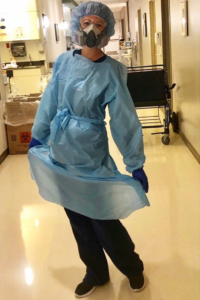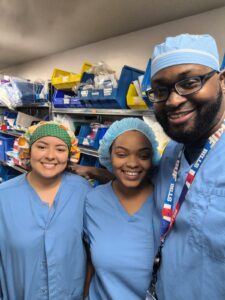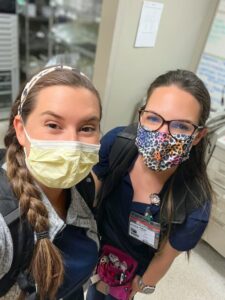In the vast and intricate world of healthcare, allied health professionals play crucial roles in ensuring patient care is effective, efficient, and comprehensive. From diagnostics to surgical assistance, these healthcare professionals are indispensable.
As we celebrate Allied Health Week, let’s take a closer look at the diverse range of allied health roles and the vital functions they serve in the healthcare system. Whether it’s the detailed imaging provided by X-Ray technologists or the precision of cardiac cath lab technologists, these professionals are the backbone of patient care across the country.
 X-Ray Technologists: The First Line of Diagnostic Imaging
X-Ray Technologists: The First Line of Diagnostic ImagingX-Ray technologists, also known as radiology technologists, are crucial in capturing images that help diagnose various medical conditions. These professionals operate X-ray machines and other imaging equipment to produce clear, diagnostic images essential for accurate medical assessments.
They prepare patients for imaging procedures, ensuring adherence to safety protocols, and collaborate closely with radiologists to interpret the results. Their education generally includes an associate degree in radiologic technology, complemented by certification from the American Registry of Radiologic Technologists (ARRT). Their role is vital in medical settings nationwide, ensuring timely and precise diagnostic imaging.
MRI technologists are proficient in using magnetic resonance imaging equipment to capture detailed images of organs and tissues. These high-resolution images are critical for diagnosing various medical conditions, such as neurological disorders and joint injuries.
In their role, MRI techs manage complex machinery, ensure patient comfort and address any anxiety patients may feel during the procedure. Their education typically involves earning an associate degree in MRI technology or radiologic technology, followed by certification from the ARRT. The specialized skills of MRI technologists make them indispensable in medical settings, ensuring accurate and thorough diagnostic imaging for healthcare providers.
Interventional radiology technologists are essential team members in performing minimally invasive procedures guided by medical imaging. These procedures, such as angioplasty, stent placement, and biopsies, require high levels of precision and expertise.
Interventional radiology technologists are proficient in operating fluoroscopy and other advanced imaging equipment, ensuring real-time imaging during procedures. Their responsibilities also include maintaining a sterile environment, assisting physicians with intricate tasks, and prioritizing patient safety throughout the process.
Their specialized skills provide critical support in offering patients less invasive treatment options and improving recovery times, making them invaluable in hospitals and clinics across the nation.

Sterile processing technicians meticulously decontaminate, inspect, sterilize and distribute surgical instruments, maintaining the highest standards of safety and hygiene. They are responsible for the critical task of preventing infections and ensuring that all medical tools are safe for use in surgical procedures. Their meticulous work behind the scenes supports the entire surgical team by providing clean, sterile instruments necessary for successful operations.
Education and training for sterile processing technicians often involve completing a specialized program that covers the principles of sterilization, microbiology, and infection control. Many professionals in this field also pursue certification through organizations such as the Certification Board for Sterile Processing and Distribution (CBSPD). These certifications validate their expertise and commitment to maintaining rigorous standards in sterilization practices.
Sterile processing technicians must be detail-oriented and possess a thorough understanding of sterilization protocols and equipment maintenance. Their role requires them to stay up-to-date with the latest advancements in sterilization technology and infection control practices. They work closely with surgical teams to ensure that all instruments are correctly prepared and available when needed.
Given the critical nature of their responsibilities, sterile processing technicians are in high demand across various healthcare settings, including hospitals, outpatient surgery centers, and specialty clinics. Their expertise contributes significantly to patient safety and the overall success of surgical procedures, making them indispensable members of the healthcare community.
 Cardiac Cath Lab Technologists: Specialists in Heart Health
Cardiac Cath Lab Technologists: Specialists in Heart HealthCardiac cath lab technologists play a critical role in the diagnosis and treatment of cardiovascular conditions. Working closely with cardiologists, these professionals possess skills in the use of catheter-based imaging techniques to identify heart abnormalities. They are involved in preparing patients for procedures, which includes explaining the process, ensuring patient comfort, and setting up the necessary equipment.
During procedures such as angiograms and cardiac catheterizations, cardiac cath lab technologists operate imaging machinery to provide real-time visuals of the heart and blood vessels. They meticulously monitor patient vitals and assist the cardiologist by providing necessary tools and support throughout the procedure. Their expertise ensures procedures are carried out smoothly, efficiently and safely.
Certification from recognized bodies such as Cardiovascular Credentialing International (CCI) or the American Registry of Radiologic Technologists (ARRT) is often a requirement to demonstrate proficiency and professionalism in the field.
These technologists must possess a thorough understanding of cardiovascular anatomy, procedural protocols, and the operation of complex imaging equipment. Strong communication skills are also essential, as they frequently interact with patients, providing reassurance and clear instructions.
Cardiac cath lab technologists are vital in ensuring the success of heart-related procedures and improving patient outcomes. Their specialized skills and dedication to patient care make them indispensable members of cardiac care teams in hospitals and specialized cardiac centers across the country.